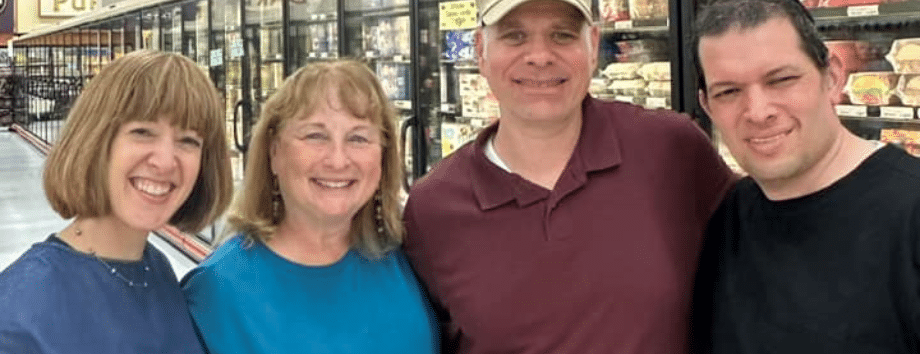Meet Dr. Sheryl Cooper
July 17, 2024 | People in Our Neighborhood

By Jewish Connection Network
Dr. Sheryl Cooper is pictured above, second to the left, along with Yael Zelinger and two Deafblind Shabbaton participants.
Give a brief background about the Deafblind Shabbaton and how you became involved in it.
Sometime in 2009, Rabbi Eliezer Lederfeind from the OU contacted me to discuss the possibility of hosting a Shabbaton for Deafblind people. We learned that several Jewish Deafblind individuals were attending an annual “camp” for Deafblind adults. We thought it was a good opportunity to provide a Jewish connection to these individuals. I was, and still am, very immersed in the Jewish, Deaf, and Deafblind communities separately, and this seemed like an amazing opportunity to bring together my interests while benefitting the communities I care about.
I reached out to Yael Zelinger who previously worked for the Center for Jewish Education coordinating programing for the Baltimore Jewish Deaf community, and a long-lasting and complementary partnership began. Yael had the resources of The Associated, I had 30+ years of experience working with Deafblind people, and we both had the passion for this project. We fumbled our way through planning the first Shabbaton in June 2010, and both realized that we were meeting an unmet need for Deafblind Jews to meet, share, and learn. Since that time, we’ve hosted 7 Shabbatonim and we are so proud to have fostered the development of the Jewish Deafblind community, the growth of friendships among our participants, and so much Jewish learning! Yael has been a great partner to work with, full of creativity and attention to every detail!
How has your involvement in the Deafblind Shabbaton impacted your perspective on community and inclusion?
When we started in 2010, we were a small committee of mostly hearing people doing a mitzvah “for” the Deafblind community, with no Deaflbind people helping with the planning. Over the years, we have learned the importance of including Deafblind individuals in all aspects of the planning. They know what works best for themselves — in terms of seating, lighting, activities, scheduling, food choices (try chasing peas onto your fork with your eyes closed), and the overall pace of the weekend.
In the disability community, there is a saying, “Nothing about us without us.” We have learned how important it is to include our Deafblind participants in every committee and sub-committee for the weekend. They have guided us to make decisions that increase their enjoyment and participation throughout the weekend. Having just completed our seventh Shabbaton, we are proud that so many of our participants now lead workshops, activities, games, blessings, and services throughout the weekend.
The Shabbaton is also a great leadership opportunity for the local Baltimore Jewish Deaf community. Members of our local community are part of the planning team and volunteer at the Shabbaton in a variety of roles.
What would you like to see for the future of the Shabbaton and inclusion in general in the Baltimore Jewish Deaf community?
At this point, I believe we have started a great process but we know we are not there yet. We need to continue to focus on making the Deafblind Shabbaton totally Deafblind-centric, not just a Shabbaton with interpreters. This means continuing to seek advice from Jewish Deafblind leaders for our planning committees, our religious services and more.
This event is hosted in Baltimore, but we serve Deafblind Jews from all over the world. Over the years, we have had several participants from Canada and Israel, as well as the US. Because we are serving participants outside of Baltimore, it would be helpful to get funding from the communities where our participants live, and not have to depend only on Baltimore’s agencies and private donors for support. We rely on grants and donations; the Deafblind Shabbaton is not a line item in any organization’s budget, so permanent funding is a big goal for us.
Our participants have asked many times over the years for a Birthright-style trip to Israel strictly for Deafblind Jews that would meet their needs in term of a slower pace, attractions that focus on taste, touch, and smell, and the opportunity to bond with other Deafblind Jews experiencing Israel for the first time. We have not been successful in finding funding to fulfill this dream.
It has been my privilege to live and work with the Baltimore Jewish Deaf community for 45 years, and I sincerely appreciate all that I have learned from my Deaf and Deafblind friends and colleagues. My wish for the future is that all events in our area (and everywhere!) will be accessible for all people of all abilities as a part of the organic planning process, and that Deaf and Deafblind people will be recognized as integral and contributing members of our community.
I love being involved in the Jewish, Deaf, and Deafblind communities, and have served on many professional and non-profit Boards and committees over the 4 1/2 decades of my career. I’m a bit of a workaholic and have always dedicated a lot of my free time to community service, including activities like attending annual conferences of the American Association of the Deafblind and volunteering at the Deafblind Camp of Maryland.